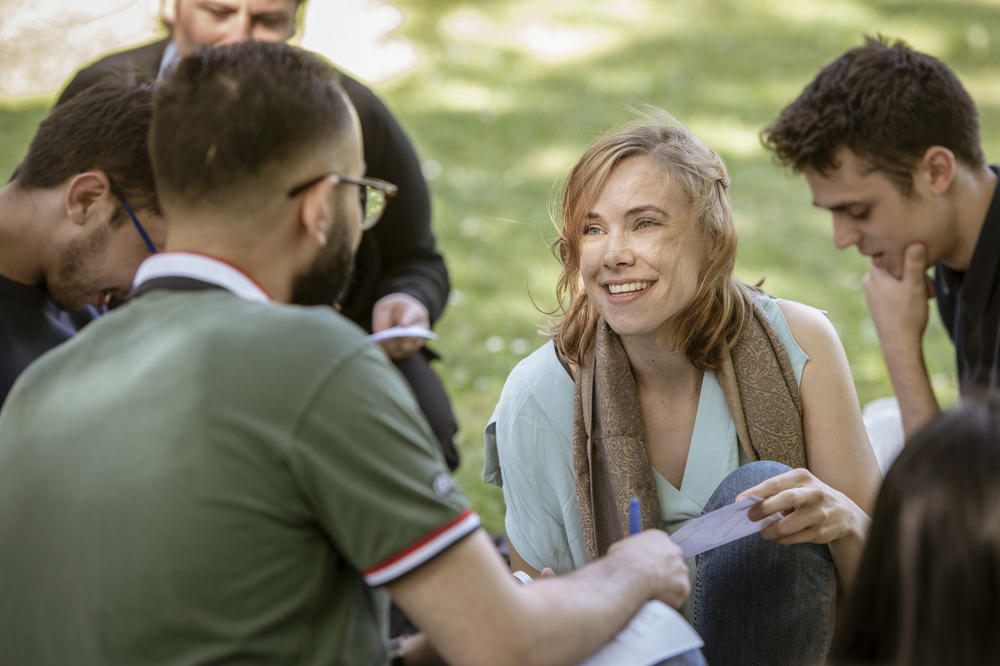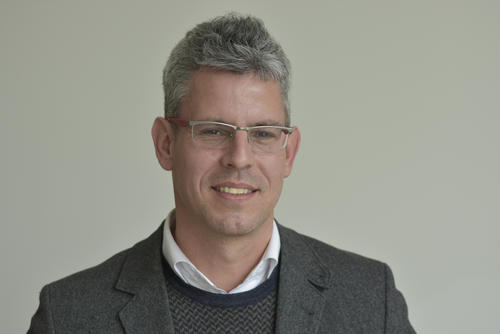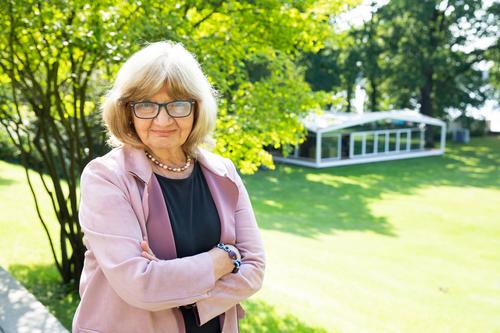“Regaining Lost Knowledge”
November 21 and 22, 2019: First Network Conference of “Academics in Solidarity” (AiS) – An Interview with Florian Kohstall, Director of the Welcome Initiative and Founder of AiS
Nov 18, 2019
Refugees can learn German through tandem language partnerships as part of the buddy program.
Image Credit: Bernd Wannenmacher
There are currently 80 refugee researchers in the “Academics in Solidarity” network. The project, which supports scholars and scientists living in exile, has received around 600,000 euros in funding from the German Federal Ministry of Education and Research for the next three years. It is part of the university’s Center for International Cooperation. “Academics in Solidary” was founded by Florian Kohstall, the director of Freie Universität’s Welcome Initiative, with the support of the Arab-German Young Academy of Sciences and Humanities (AGYA) and Freie Universität Berlin.
Florian Kohstall, director of Freie Universität’s Welcome Initiative
Image Credit: Bernd Wannenmacher
Mr. Kohstall, the first network conference of “Academics in Solidarity” will take place on November 21 and 22 at Freie Universität Berlin. The conference’s title is “Regaining Lost Knowledge – Connecting Research at Home and in Exile” – what is the goal of the conference?
We have multiple goals at the conference: Foremost, we want our mentees – researchers who have been forced to leave their home countries due to war, violence, or excessive limitations to their academic freedom – to have the opportunity to present their research and connect with established colleagues. We chose the title “Regaining Lost Knowledge” because it speaks to the phenomenon of how important knowledge gets lost through forced migration. Presenting that knowledge here is thus one of our main concerns.
We also want to have conversations about how we can open doors to long-term opportunities for researchers in exile so that they might someday be able to continue on with their life and work and move past the special circumstances of living in exile. Presenting their research and their specific contributions to their fields is another way of supporting those efforts. Finally, we want to talk about how we can connect research in exile with research in refugees’ home countries. We will hold a panel discussion on the current situation of refugee researchers in prominent host countries, including Lebanon, Jordan, and Turkey.
Who is your target audience?
In addition to our mentees, the conference is of interest to researchers who might want to participate in our mentoring program and help refugee and at-risk researchers find their way into the academic job market. “Academics in Solidarity” is a nation-wide project. We hope to connect the people who contact us with other researchers working on closely related topics. Ideally, the contact would lead to a grant proposal that would benefit both sides: a job for the mentee and a new regional focus for the mentor.
Professor Seyhan, literary scholar from Bryn Mawr College (USA), works on German and Turkish literature.
Image Credit: American Academy
The keynote speaker is Professor Azade Seyhan from Bryn Mawr College (USA) – what is Ms. Seyhan’s area of work and what will she speak about?
Professor Seyhan is a literary scholar and works on German and Turkish literature. She is currently conducting research at the American Academy for her project “Exile in Translation: The Exodus of German Culture to Turkey (1933-1945).” Her talk will take a comparative approach to the topic of research in exile.
These historical comparisons are very important for us in our work with the current circumstances surrounding exile research. Today things are much different from the Nazi period when people like Ernst Reuter and a great number of other researchers fled to Turkey from Germany, or Hannah Arendt, who went to New York and taught at the New School. Despite the difficulties, Ernst Reuter and Hanna Arendt were still able to pursue their carriers in exile. I am not saying that it is more difficult or impossible to continue an academic career today along similar lines. But perhaps institutions need to provide different kinds of support in order to ensure that today’s researchers in exile are able to play similarly significant roles.
Why is Freie Universität committed to projects like “Academics in Solidarity” and other networks with similar concerns (such as “Scholars at Risk”)?
When Freie Universität joined “Scholars at Risk” in 2011, it was the only German university in the network. Now, over 20 visiting researchers with “at-risk” status are working on projects at Freie Universität. We are also partners with the Academy in Exile. These efforts have a lot to do with the history of Freie Universität Berlin’s founding and its motto “Iustitia, Veritas, Libertas.” Academic freedom is a hot topic at the university and continues to come up in debates. As a university with long-standing ties to universities abroad, we also have special “antennas” when it comes to violations of academic freedom. It comes as no surprise that Freie Universität would go to great lengths to support students and researchers who are in danger or have been forced into exile.
Christine Boldt conducted the interview.
The original interview in German was published in campus.leben, Freie Universität's online magazine, on November 18, 2019.
Further Information
“Academics in Solidarity” (AiS) network conference on “Regaining Lost Knowledge – Connecting Research at Home and in Exile”
Time, Location, and Registration
- Public events: Keynote lecture and panel discussion on November 21, 2019, at 10:00 a.m. to 12:30 p.m. Henry Ford Building, Freie Universität Berlin, Garystraße 35 (lecture hall A), 14195 Berlin, Subway station: Freie Universität/Thielplatz (U3)
- To register for the conference, please send an email to ais@fu-berlin.de



